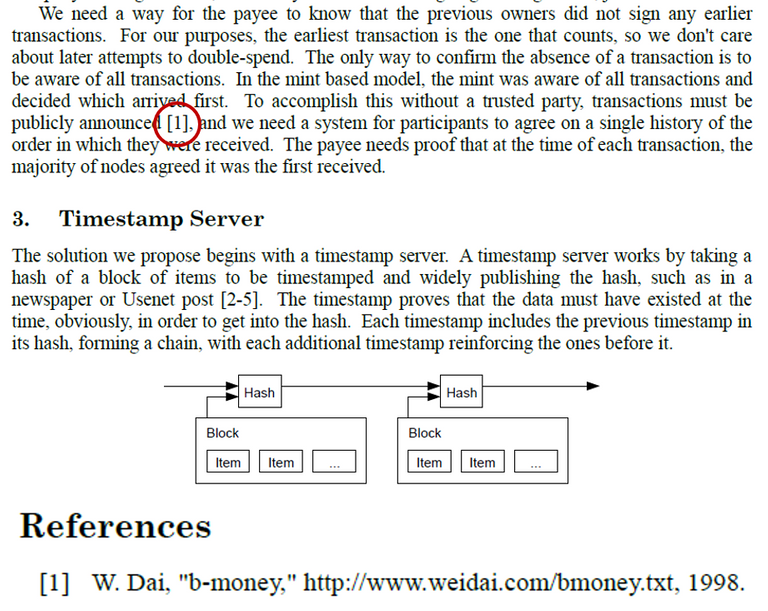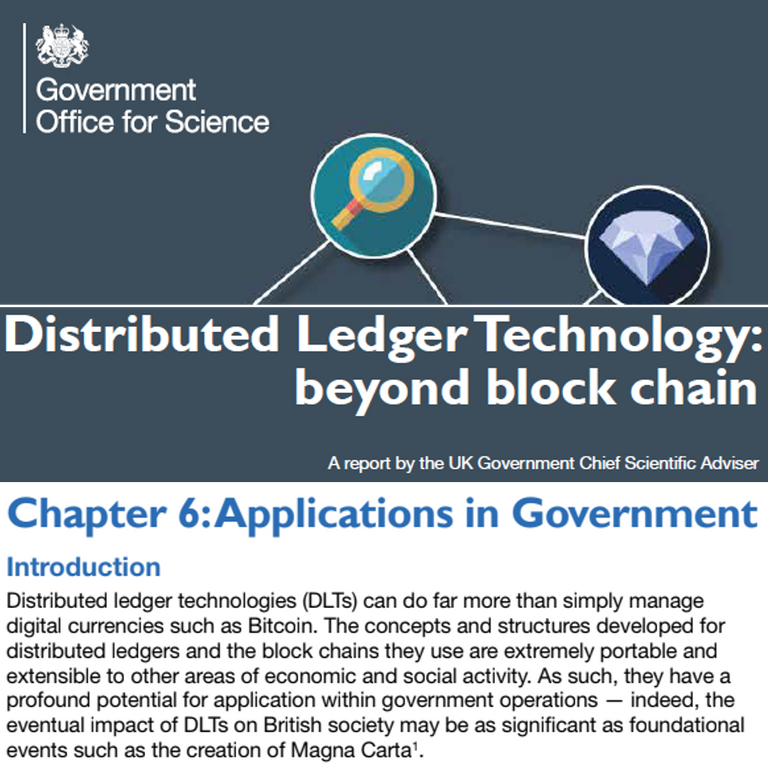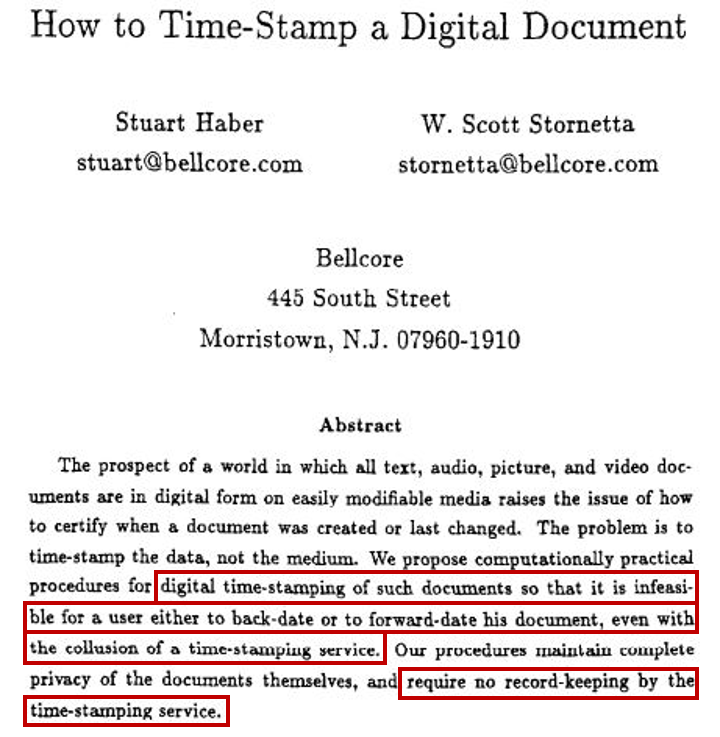We only began to consider "blockchain" because of "crypto-anarchy"
Although proposed by Haber and Stornetta in 1991, the blockchain only became popular about two decades later, thanks to Bitcoin's success.
The Bitcoin paper described the first implementation of Haber and Stornetta's architecture which proved commercially-viable and long lived. And the very first quote in the Bitcoin paper is Wei Dai's "b-money". Wei Dai's paper in turn starts with these words:
I am fascinated by Tim May's crypto-anarchy. Unlike the communities traditionally associated with the word "anarchy", in a crypto-anarchy the government is not temporarily destroyed but permanently forbidden and permanently unnecessary.


Can blockchain bring value to governments?
One might be inclined to think that a technology which can be used to make government "unnecessary" and thus support "anarchy" is not an immediate fit for government processes. And yet, many authors have highlighted potential benefits that blockchain and, more generally "distributed ledger technologies" could bring to governments, perhaps none more emphatically than a 2016 report from the UK Government Office for science who did not shy away from writing:
the eventual impact of DLTs on British society may be as significant as foundational events such as the creation of Magna Carta

In practice, 7 years later, aside from Estonia's government military-grade blockchain, there are preciously few "government blockchains" in operation.
It is thus worth looking back to the 1991 - 2009 period and asking why no large-scale implementation of Haber and Stornetta's theoretical solution became well-known before Bitcoin.
Among the reasons, the fact that "blockchain" is an inherently inefficient architecture ranks, no doubt, very high. In exchange for increased IT costs (redundancy), it manufactures trust between actors who are anonymous or who do not trust each other. Essential to this process of turning computing power into predictable behaviours and thus trust is the axiom "people respond to incentives".
By contrast, the classical way to manufacture trust is through laws and contracts. Laws and contracts use constraints, penalties and enforcement rather than incentives. Most of the time, it's cheaper to manufacture trust by using the law and classical contracting.
Blockchains have become somewhat competitive thanks to the productivity gains generated by the massive investments of the past ten years. There are now a lot more ready-to-use code libraries, blockchain developers and architecture variants to choose from than in 2009 when "the only game in town" was Bitcoin.
Given that governments are traditionally using the law, some interesting questions are:
- When is it more interesting to increase the predictability of actors (and thus manufacture trust and foster cooperation) by using a blockchain rather than by using the law?
- Are there situations where it makes sense to use both the law and a blockchain?
- What are the essential design elements of a blockchain application in a government context?
The EBSI adventure
Recently, the European Blockchain Partnership has launched EBSI (the European Blockchain Services Infrastructure) with a first use case, that of "Verifiable Credentials". The first application is turned toward solving (or at least alleviating) student mobility in Europe. Students' credentials are stored in their personal wallets and "notarized" by the issuer on EBSI. This way, the student can prove to a verifier that a credential she displays from her wallet is authentic and hasn't been invalidated, without personal data being exposed on the blockchain.
Note that in the chosen scenario the data of the credential itself is not on the blockchain. The benefit of that choice is "not taking any GDPR-induced risk". The price to pay is that credentials and their owners are not "discoverable". That means that a brilliant, but financially-needy student can try her luck and contact an university in order to request a scholarship, but a rich university cannot search the blockchain for a brilliant but financially-needy student to whom to offer a scholarship, because the openness and transparency typical of blockchains are wasted here: only opaque hashes are stored, not actual searchable data.
The apparition of a second application, linked to worker mobility and their social security rights, has generated some debate about the role that EBSI could play. One possible function which has been proposed is that of a "trusted register of issuers"
Is such an architecture bringing value?
First let's note that the setting in which this solution is being proposed has a relatively low "cost sensitivity": budgets for such pan-European solutions are, if not unlimited, quite generous. Given the omni-presence of laws, contracts, and SLAs, the first interrogation is:
- Would "a trusted register of issuers" be more expensive to build and operate using a classical , centralized (if "load balanced" and "high availability") architecture? Or less expensive? Well, it depends on the cost of building and operating it on top of EBSI - a cost composed from a share of the total EBSI cost and a marginal cost for the specific "register of issuers" application.
But what about trust? Despite the pervasiveness of laws and regulation, I've illustrated in the past how, in the complex context of Europe, law is sometimes not enough to get cooperation going between member states and a carefully thought out, incentive-based mechanism can bring the trust level above the threshold needed for collaboration to start.
Thus the second interrogation in this context would be:
- Would the member states have cooperated for the European Social security pass if blockchain had not been used? Was there enough trust for them to engage in collaboration on this issue?
Imagine the answer to the above question is "no", as it had been the case for the "European Financial Transparency Gateway" back in 2019. We should note here that, notwithstanding the availability of budgets, "adding blockchain" should not be taken lightly: indeed manufacturing trust through the law is already expensive, and what we are basically contemplating here is adding yet more costs by topping laws with a blockchain application.
At that point we naturally get to the third question:
- what is the right economic mechanism design for the "trusted register of issuers" application that supplements the existing legal constraints with the necessary incentives in order to trigger cooperation in a situation where the law alone was not successful?
Conclusion
Authority, constraints and incentives are the three main tools for the effective governance of a productive organization. In a government context, where both "authority" and "constraints" are maximized, blockchain (as a tool supporting uncoerced, incentive-based cooperation) is not an immediate, natural fit.
Despite a significant reduction in implementation and operation costs, blockchains are inherently less economically efficient than centralized architectures. However, they might be needed when the authority of government and the constraints of laws and regulations prove insufficient to trigger cooperation. Blockchains main benefit in such situations is their suitability for supporting an economic mechanism design which aligns incentives among participants
Et à la contrainte, je veux privilégier l'incitation
French Président Emmanuel Macron, 2018


Great article that has helped @perrinecoet and myself in our discussion with our higher education ministry about verifiable credentials for diploma using EBSI 👌
Thank you Pierre!
You are right
Well, I feel authority is the most important
Many of the issues of today's world can be traced back to an erosion of authority - people in the West have, to a significant extent, lost faith - so the authority of God has been weakened. Then they lost respect for state and government because of corruption and incompetence, and the authority of experts has also massively decreased. "Authority" is in marked decline in the West, which now has to rely on a much greater scale on constraints and incentives
i surely need to think a lot about it before i can feel having a well formed opinion about all that. Thx for ur effort
Congratulations @sorin.cristescu! You have completed the following achievement on the Hive blockchain And have been rewarded with New badge(s)
Your next target is to reach 90000 upvotes.
You can view your badges on your board and compare yourself to others in the Ranking
If you no longer want to receive notifications, reply to this comment with the word
STOPCheck out our last posts:
Salut, am scris si pe discord dar nu stiam daca-l mai folosesti:
Am verificat contul tau si am vazut ca ai 18K de LARYNX tokens care doar stau acolo si nu fac nimic. Poti sa faci powerup cu ei sau poti sa-i adaugi la delegarea care ai facut-o pentru mine pe contul carloaxie. https://vue.dlux.io/ dai login si din dreapta sus trebuie sa ajungi la wallet, selectezi tokenul SPK si de acolo cred ca te descurci mai departe.Salut,
Am vazut mesajul pe Discord :) Ma uit